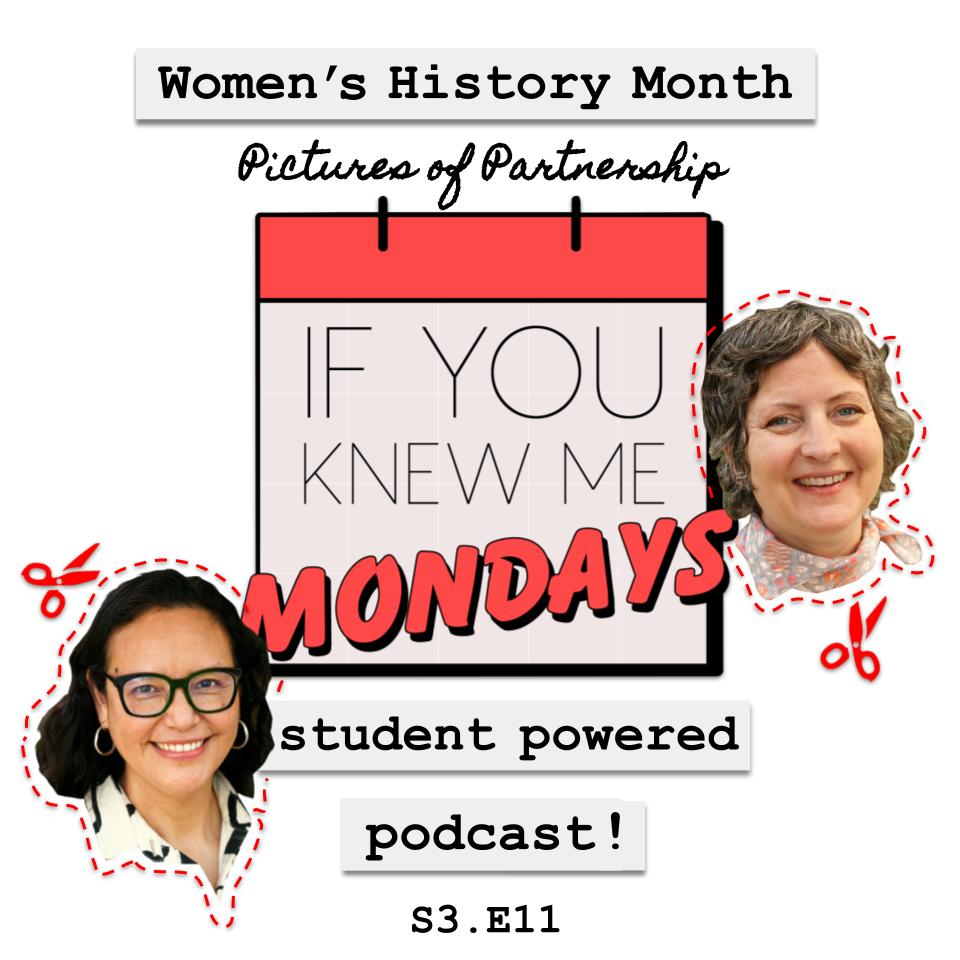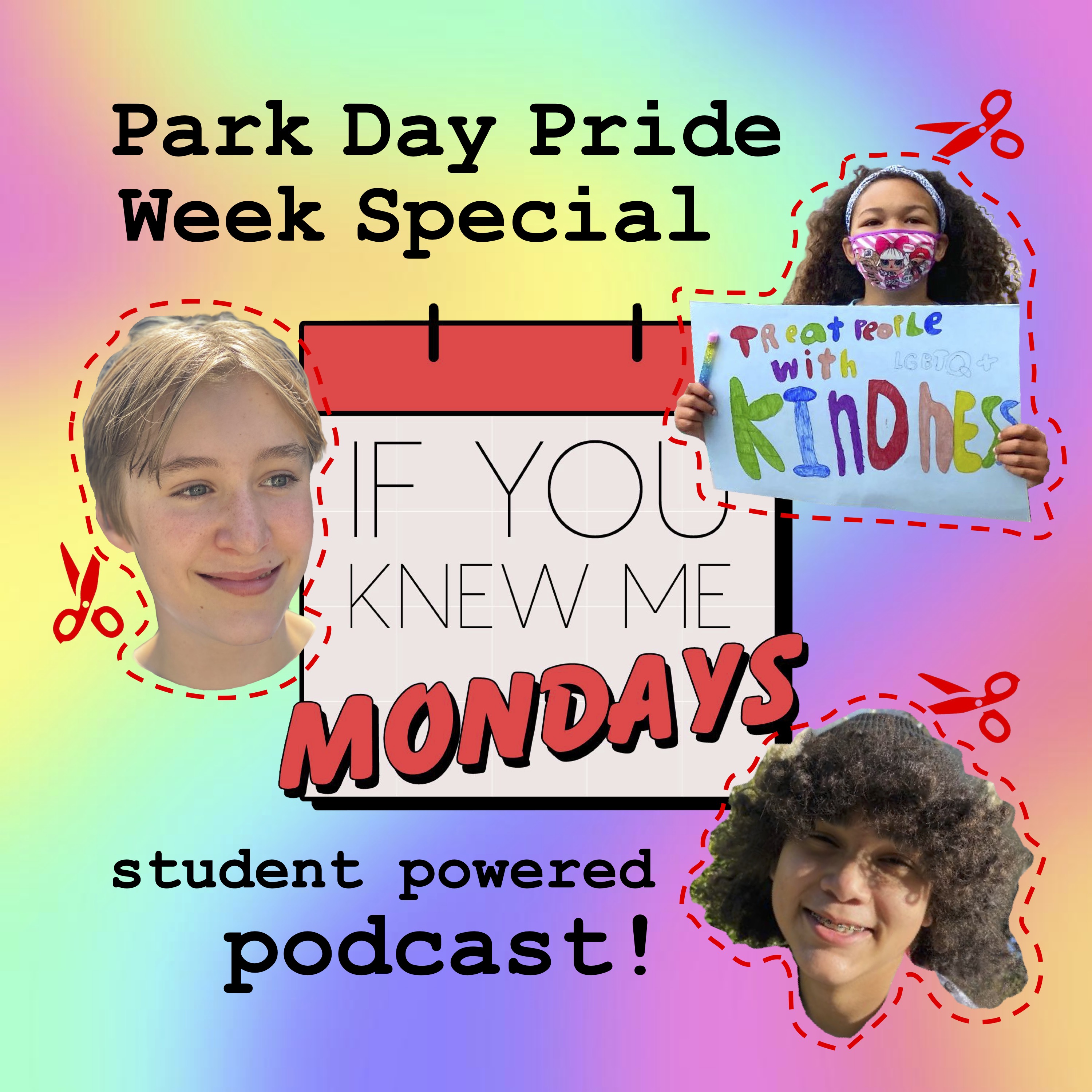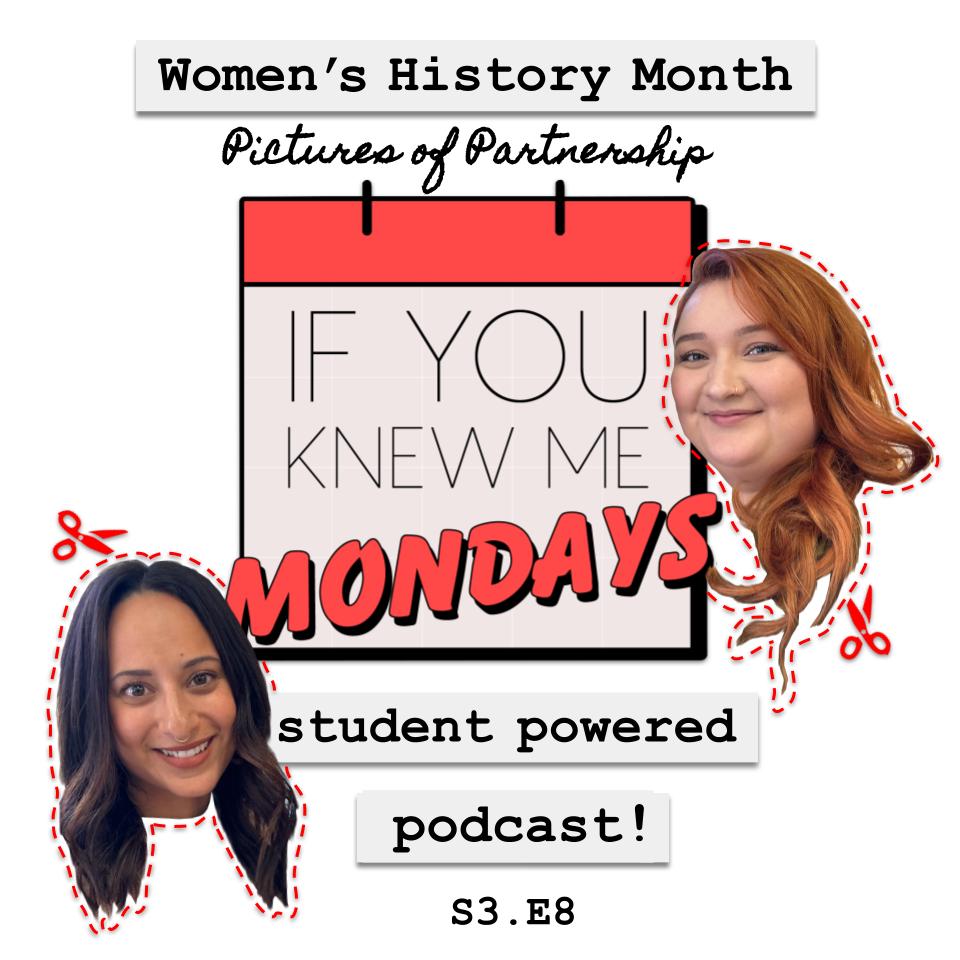Episode Transcript
[00:00:00] Speaker A: If you really knew me? If you really knew me?
[00:00:03] Speaker B: If you really knew me?
[00:00:05] Speaker C: If you really knew me, you would know.
[00:00:07] Speaker A: Hey. Who are you? Who, me? Yeah, you. It's Monday.
Hello and welcome to if you knew me Mondays, a student powered, park day inspired podcast that builds belonging by sharing stories and perspectives from the margins of our school and community. Say what? My name is Ava. And if you really knew me, you would know that I am Chinese American. And I'm Ellie. And if you really knew me, you would know that I love piano.
Hi, my name is Johan. If you really knew me, you would know that I like traveling, and I travel to about 20 places. My name is Willa. And if you really knew me, you would know that my dad is from Ohio and my mom is from Wisconsin. My name is Ollie. If you really knew me, you would know that I travel to a lot of places.
Hi, my name is Lennox. If you really knew me, you would know I'm Korean. Hi, my name is Everly. And if you really knew me, you would know that I really like traveling. My name is Winn. And if you really knew me, you would know that I play ukulele. My name is Beanie. If you really knew me, you would know that I love skateboarding.
And I'm Katarina. If you really knew me, you would know that I'm very good at gymnastics. We're second grade hosts, and in this episode, we're gonna tell you what we learned about the secret to living to be 100 this year. In second grade, we went on different field trips, talked to all kinds of different people, and learned a lot of new words and ideas about longevity.
Longevity means leading a long life.
Our goal is learning about how people do this. Some of the keywords you should look out for are superagers, self care, blue zones, and centenarians.
A centenarian is someone that lived to 100 or older. You can't just live to be 100 easily. You have to take care of yourself and drink wine and walk every day. What? Drink wine? Yep. Those are some of the power nine.
We're gonna tell you all about power nine secrets to being 100 and a whole lot more in this episode.
To get started, here's what our teachers, Julia, Karina, and Susan have to say about their hopes and goals for this project.
[00:02:53] Speaker D: My name is Julia, and I'm a second grade teacher.
In launching this project, we really wanted to humanize the aging process for our kids.
[00:03:08] Speaker C: My name is Susan, and I am a second grade teacher. An important part of this project was helping second graders to build relationships with superagers or other folks outside of our immediate community so that they could understand what it takes to live a full and long and happy life.
[00:03:27] Speaker E: I'm Karina. I'm a second grade teacher assistant. In Susan's classroom, kids were able to talk more about the words longevity centenarian, discover what a superager was. We talked about centuries and decades. We talked about generations.
[00:03:43] Speaker D: I think one portion of the project that surprised us is kids were able to learn that self care is a huge component to living a long and full life. And by way of this project, they were even able to explore their own self care and what self care means to not only themselves, but how self care comes from a point of privilege, and self care looks different for different members of the community.
[00:04:13] Speaker C: Between learning about the human body systems, finding out about the blue zones, building our own treasure boxes, and then actually going to senior centers to do field research to meet other centenarians in the community, the kids really had a full and rich experience.
[00:04:29] Speaker A: We started out by talking to people who lived a long life, including our family members and the family members of some of our teachers. Our teacher Karina's grandpa Pete came to visit us. He's a musician who used his culture and talents to support farm workers for many years, and he has a lot of stories to share. He even brought his guitar and played for us. Here he is now.
[00:04:55] Speaker F: Okay. Quiero quesepan que yos no con maestro. Lo qu? Llo no mace de la casa. Yeah. Okay. Okay. So what I was saying is that I am not formally instructed in guitar. What I know, I just know from different contact with a lot of different people and from home. My dad used to play accordion, and he also used to play guitar. And if you had a piano, Ron, he would try playing that, too. So he was very musically oriented, and so I'm pretty sure that's where I got that from. Okay, so what I know, I just kind of know. And what I don't know. I don't know.
Okay, so there's different styles of music. A bolero would be a four. Four time.
That's a bolero. Very slow, usually very melodic, usually very romantic. Okay. A ranchera. This is a ranchera right here. Two, four times.
Great to dance to. Oh, my God, I love dancing to those. That kind of music, it's always fast. You can do whatever you want. It's just awesome. Okay, they also have a waltz three, four times. Okay, now is. The timing is sounding familiar for anybody that plays music that sounds familiar, very european, right?
[00:06:17] Speaker A: My dad was born in the basque country, so.
[00:06:20] Speaker F: In the basque country?
[00:06:21] Speaker A: In the basque country.
[00:06:22] Speaker F: Oh, awesome.
[00:06:23] Speaker A: And so that sounds alone. Didn't that sound great? We also met our teacher, Julia's grandma. Her name is Grandma Norma. She talked about her hobbies and what she did when she was younger. Let's listen to a little bit of her interview now.
[00:06:43] Speaker B: My name is Norma Jean Gonzalez. I was born in El Centro, California. What did I like to do in elementary school? Just what normal kids do. We played at recess and studied when we were in class and had lots of friends, went to birthday parties and.
[00:07:02] Speaker D: Grim, yesterday, you told me there was this game you like to play called kick the King. Have any of you ever played kick the can?
[00:07:08] Speaker A: No.
[00:07:09] Speaker D: Me either. Grim. What is kick the can? What was that game?
[00:07:13] Speaker B: Well, if I remember correctly, it's kind of like hide and go seek. And the person that was up would kick the can and have to run and go find it and bring it back to where he started. In the meantime, the other people that were playing would run and hide someplace. And then when they found the person that was taking care of the can, whenever he found somebody, they'd come back to base. So it was just kind of a hide and seek game.
[00:07:39] Speaker D: What has helped you live a full life?
[00:07:43] Speaker B: I don't know. The good Lord, mostly.
[00:07:47] Speaker D: And what do you mean, Graham, what do you mean about the good Lord? Is that, like, you're part of your religion?
[00:07:51] Speaker B: Yeah. Well, yeah, I go to church and I believe in God, and I try to live a good life. And my six kids helped me along.
[00:08:01] Speaker D: The way, too, is what grandma is sharing. Does she have something in common with the people in the blue zones?
[00:08:09] Speaker A: After that, we did a lot of field research. We tried to find out what does self care look like? After all, self care is part of the secret to living a long life. Our field research included learning about where many centenarians lived. They have a word for it. It's called a blue zone. A blue zone is where people live to 100 or older. And there's many different blue zones all around the world. Some of them include Okinawa, Japan, and Nicoya, Costa Rica. Another place is Sardinia, Italy. There's other places, too.
All these places are different. Like, they have different cultures. For example, in Nicoya, Costa Rica, they eat beans and quesadillas with a bunch of fiber to make them live for longer. But in Sardinia, Italy, they drink wine every day.
One thing that all these blue zone places have in common is they use power nine. The power nine is nine things that help people live longer. The first one is moving naturally. Having a sense of purpose is another one. Taking time out to rest is an important one. Some people call that downshifting.
Another rule is the 80% rule, which means you should stop eating when you're 80% full. Another rule is plant slant. Plant slant is where you eat vegetables and fruits to help you live longer. In other words, you want to eat more plants than meat. People in blue zones often drink a moderate amount of wine. For some people that means one or two glasses a day. Another one is where you belong. A lot of people find a sense of belonging in their faith community. A lot of centenarians keep healthy by putting their family and loved ones first. The last of the power power nine is right tribe. That means you have a tight social circle with the people you love.
The people who follow power nine and live in blue zones are often called superagers. They live long, full lives. Our project was to unlock the secret of this longevity. Our field research also included visiting senior centers in Oakland and in Emeryville and doing some of the stuff they do, like dancing, ping pong and a lot of other fun activities.
A highlight from the senior center I went to was getting to watch people do Zumba, a type of dance that's one of the power nine, which is move naturally. On one of the field trips it was the instructor's birthday and we got to celebrate it with cupcakes. Eating cupcakes is not one of the power nine, but hanging out with your community is. We met many superagers there and noticed the power nine in action. Hi, my name is Maisie. At the senior center I learned that the seniors focus. They also let their imaginations fly. I noticed that they were flexible and old and healthy.
My name is Lydia and it surprised me that they used swords for the tai chi. We met Peter. He was 79 years old. His advice was to just join it. I was surprised of how long and well they move. I saw 20 people dancing. There is a lot of music. My name is Helena and I noticed that ballroom dancing and togetherness can help you live a longer life. Hi, my name is Avi. I noticed the seniors were very graceful and when we missed a step they helped us get it right. Social, sharp, smart. Hi, my name is Sejal. At the veterans memorial senior center I noticed some people felt the flow and didn't. Hi, I'm Lev and I have a high interest in computers. I saw aerobics. There were 21 seniors there. I used to think that table tennis wouldn't be in senior centers. But now I know some senior centers have it, too. Even our elders enjoy moving their bodies. I observed dancing as being in the right tribe. The right tribe is one of the power nine. It surprised me that people were helping each other and moving in sync.
[00:12:31] Speaker G: Sup, peeps? My name's Emmett. I used to think it was hard to move for seniors, but now I know that's not true.
[00:12:38] Speaker A: We met Kayla Brown. She works with seniors and her advice is that it never hurts to try. They're taking care of their bodies. My name is Theo. They were moving naturally. It surprised me that a 82 year old was teaching a dance class. Hi, my name is Jasper. Taichi. Dancing and ping pong are a form of self care because they are having fun. It surprises me that the person in a walker was trying to do zumba, too. I saw people doing exercise and I got to do it, too. They looked relaxed while they were dancing. And I did a little bit of dancing, too. Hi, my name is Margot. I love to visit. It was so fun to see the dancing, ping pong and Tai chi. It was so cool to see them still moving their bodies. I saw friendship and they were really social.
I loved how they can move so fast. Even though they are older. I like seeing them exercise to the music. Hi, I'm Cohen. I saw 14 people dancing and moving their bodies. They seem much older, but they move so well. Hi, my name is Winnie. No matter how old you are, you can do anything. Love, Winnie.
As you just heard, we learned a lot on our visit to the senior centers. For many of us, it was our first time visiting a senior community. Between these field trips, classroom visits from grandma Norma and Grandpa Pete, and all of our research, we can say that the secret to living to 100 years old is not so much a secret.
We want to thank our teachers, Grandpa Pete, Grandma Norma Jean, and all of the super agers we met, danced, and played with. Okay, I think that does it for this episode, the first ever second grade podcast at Poke day. Once again, we're your hosts, Ava. Willa. Ellie. Everly. Ollie Lennox. I'm Bean. And I'm Katarina. Thank you for listening and catch you on the next episode of if you knew me Mondays.
Bye.


